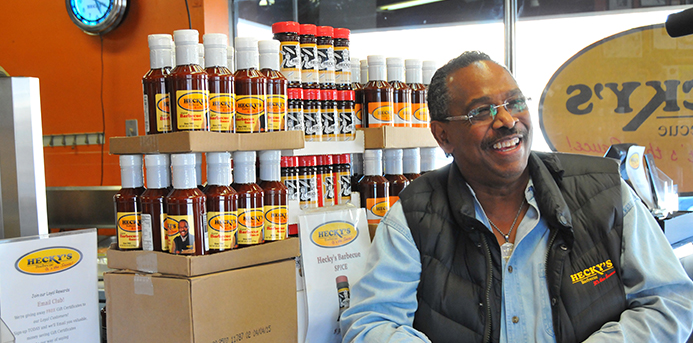Restaurateur and social entrepreneur Hecky Powell proudly honors and reflects the values of his great-grandfather — a slave who learned hard work in cotton fields, escaped using the Underground Railroad, raised a large family and eventually settled in Evanston as the town’s first black barber.
Powell owns Hecky’s Barbecue in Evanston, which was voted Best Barbecue by Make It Better readers this year. His latest entrepreneurial endeavor, Juneteenth Strawberry Soda, bears his great-grandfather’s image.
All proceeds from the soda are donated to the nonprofit Powell founded and named in memory of his father who, like his great-grandfather, was a model of determination and commitment to hard work.
The Forrest E. Powell Foundation promotes and recognizes these values, giving awards to local heroes whose work exemplifies the mission of the foundation and scholarships to young people entering trade schools and vocational programs.
Powell’s firm conviction that the world needs more people like his forebears and fewer who rely on handouts drives all he does in life, business and our community. We at Make It Better firmly believe that more needs to be done to celebrate the Hecky Powells of the world. So we were delighted when Powell and his wife, Cheryl, an adjunct faculty member of Northwestern University’s School of Education and Social Policy, came to our office for an interview and taste test of Juneteenth soda.
“My great-grandfather moved to Evanston in 1905, when he was 42. He was married and had worked as a longshoreman,” explains Powell, describing his fascinating lineage. “He became so successful as a barber that, even though banks wouldn’t give loans or mortgages to blacks then, he was able to build his own home.” Tragedy didn’t slow down the elder Powell either. “His daughter died when her son — my father, Forrest — was 4. So great-grandfather raised my father and his siblings too.”
Forrest Powell attended Evanston Township High School (ETHS), where he yearned to play football but was denied the opportunity because he was black. So he started his own league, referred to as “Pike’s Pals.” Forrest continually carved his way through life this way — with determination, drive and dignity.
“Dad never went to college, but he raised nine children from two marriages, bought his own home, never took food stamps or handouts,” says Powell. “He was quiet, but strong. He did domestic work in Winnetka — cutting grass, scrubbing floors on his hands and knees.” Powell also recalls going to work with his father and siblings during this time.
When they returned home from long days of physical labor, the Powell family always ate well. Hecky’s mother — Forrest’s wife, Verna, who grew up in New Orleans — was a fantastic chef.
Forrest was highly regarded in his community. He served as president of the social club “North Shore 12,” which put on debutante balls as one of its fundraising functions.
Hecky Powell accomplished what his father and great-grandfather couldn’t — he earned a college degree, from Northeastern Illinois University in Social Services Administration. For many years he worked for government programs that were intended to give a helping hand to those in need.
Thirty-two years ago, a friend wanted to sell the restaurant that was next door to what was then Powell’s government office. Thinking that it would be a good project for his parents — particularly his Creole cook mother — Powell bought the restaurant on contract for $30,000.
“Soon after that,” Powell explains, “I recommended that one of my clients apply to work at the restaurant too. She declined though, explaining that it would cost her too much money. She would have to give up her food stamps and other handouts.”
Powell shakes his head, still feeling the frustration all these years later. “I was starting to see the kids of people I had worked with coming through too.” He lost faith in the welfare system and, deciding he could help more people by running a good business, quit his job to join his parents at the restaurant. He also married Cheryl, his second wife.
In 1993, Forrest died suddenly after spending the day with Hecky working to clear damage in his front yard caused by a big storm. “I helped him saw a big tree branch. As I was leaving, I had a premonition, ‘This will be the last time you are going to work with him.’ Because I grew up working with him, I gave him an extra long look and waved goodbye,” recalls Powell. “My siblings never got to say goodbye. But fortunately that day, I did.”
The death of his father further increased Powell’s drive to give back to the community. “I’ve always felt compelled to give back,” says Powell. “We’ve helped a lot of kids through the business, Little Leagues, ETHS. But his death got me going on the Foundation.”
Annual events include a Palm Sunday jazz brunch concert fundraiser and a Juneteenth Awards ceremony. (Juneteenth refers to June 19, 1865, the date when the last group of slaves in the country learned they were freed — two and a half years after Abraham Lincoln’s Emancipation Proclamation.)
Not only does Hecky’s donate 100 percent of the Juneteenth Strawberry Soda sales to the foundation, it also donates 10 percent of the proceeds from sales of their popular sauces.
From his father and great-grandfather before him, Hecky Powell inherited tremendous values and a powerfully positive legacy. With his entrepreneurial spirit, he amplifies this heritage to make the world a better place for local youth and unsung hardworking heroes.
More from Make It Better:

